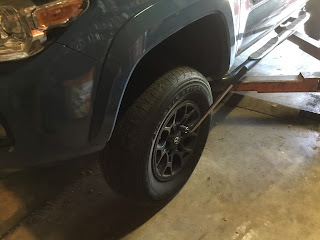Though one of the primary rules for this blog has been "no politics," I am going to sound out about tariffs, in general. In my Macroeconomics class way back, we studied how they tend to punish the populace of the nation that levies them, especially when import-substitution may take years or decades to accomplish.
Our 2006 Honda needs bushings for the rear differential. Our 2003 Silverado needs oxygen sensors. Both are DIY jobs, but the Honda's work will be tedious so I asked a mechanic doing some brake-work to replace the bushings.
"Sure, if I can get the parts," came the reply.
That prompted me to order the Oxygen sensors for the pickup NOW. I'm certain they are Chinese made. I think lots of Americans are panic-buying ahead of the tariffs taking effect, hedging their bets against chaos. Costco the other day was rather feral.
But let's play along with our so-called leader for a moment. In particular I want to test his crazy notion that we can bring manufacturing back home fast.
Let's say I wanted to open Tractorpunk Bushings LLC tomorrow. I'd apply for a loan, find a location in a light-industrial park, purchase equipment. In theory, I might get my first bushings molded and listed for sale in a year. But how many could I produce, even if one could 3D print them in polyurethane or rubber? And how would I buy rights to bushings patented by major manufacturers, domestic or foreign? Where might I find employees skilled at running the machinery, which these days requires computer skills? I'd need someone to manage the advertising, shipping, and order fulfillment.
And how many vehicles in need of bushings are on the roads and in the fields of this nation?
As a Distributist, I think we should have local manufacturers: tens of thousands making and selling things from open-source designs licensed in the Creative Commons. I could even foresee a galaxy of small firms building a hundred cars and trucks locally each year, based on low-tech utilitarian models with good pollution controls and safety features. Customers wanting high-tech or luxury in their vehicles would pay more or pay a specialist to come to Tractorpunk Cottage Motors to install that infotainment system or leather heated seats.
My idea goes back to something I wrote about before: vehicles have gotten too complex and it's best to buy a really old one and fix it yourself if possible. YouTube makes that work. Where do you think I learned to change O2 sensors and bushings? The best videos come from small companies that sell the parts. But where do they get them?
My Distributist alternate reality for a million cottage fabricators would be even harder than the Free-Market, patent-driven Capitalist model I described.
So for now, stock up and watch YouTube. You may have to DIY things for a while. If you are serious, invest in jack-stands, a creeper, work light, and a good set of wrenches. You are going to need them.
Plant a garden too. Learn to can and dehydrate. Save seeds. Think about how to defend yourself. Meet your neighbors and share work, without talking politics or religion. Put down the phone on which you are doom-scrolling, turn off the TV for a few hours, and learn a craft for making, mending, sewing, knitting, building.
These are troubling times. I don't see them improving without a crisis of the sort we in the States have not witnessed in many, many decades.
This post may be one of the gentlest slams on our leadership, such as it is, as you will ever read. Maybe we should be screaming. I think we will, once the real price of arbitrary tariffs sink in and cut into our household budgets.










